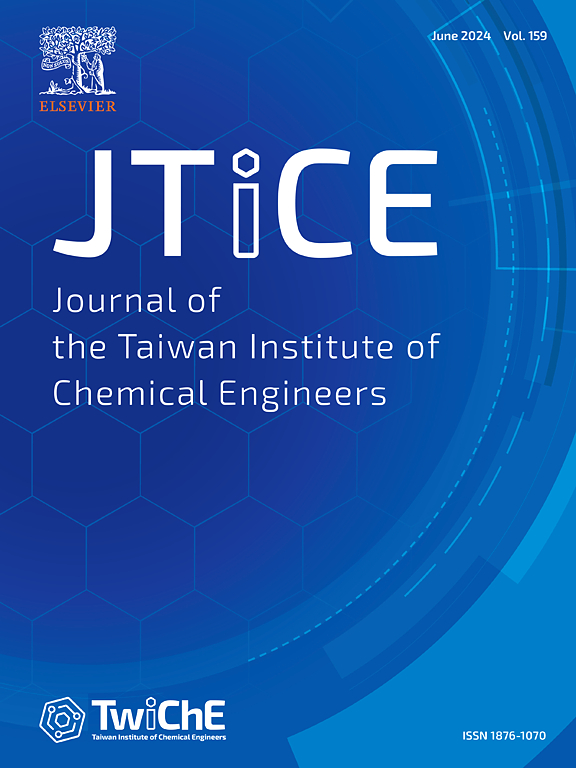基于白鲸优化的一氧化碳浓度预测新技术——极限梯度提升(BWO-XGBoost)
IF 5.5
3区 工程技术
Q1 ENGINEERING, CHEMICAL
Journal of the Taiwan Institute of Chemical Engineers
Pub Date : 2025-02-27
DOI:10.1016/j.jtice.2025.106045
引用次数: 0
摘要
一氧化碳(CO)是一种有毒气体,对人类健康和生态系统构成严重威胁。监测一氧化碳浓度势在必行。然而,由于数据处理和模型训练的限制,目前用于CO浓度检测的算法精度较低。这些算法未能充分考虑CO浓度数据的复杂性和非线性关系,需要寻找更有效和精确的方法。方法在本研究中,我们首先引入一种结合互信息(MI)和随机森林(RF)的MI-RF特征选择算法来提取关键特征。随后,我们引入了BWO-XGBoost,该算法结合了白鲸优化(BWO)和极限梯度增强(XGBoost),以达到更高的预测精度。我们将其与k -近邻(KNN)、梯度增强决策树(GBDT)、支持向量回归(SVR)和XGBoost等传统模型进行了比较。实验结果表明,所提出的BWO-XGBoost在拟合和预测精度方面表现出优异的性能。本文章由计算机程序翻译,如有差异,请以英文原文为准。

A novel concentration prediction technique of carbon monoxide (CO) based on beluga whale optimization-extreme gradient boosting (BWO-XGBoost)
Background
Carbon monoxide (CO), as a toxic gas, poses serious threats to human health and the ecosystem. Monitoring CO concentration is imperative. However, current algorithms used for CO concentration detection suffer from low accuracy due to limitations in data processing and model training. These algorithms fail to adequately consider the complexity and non-linear relationships within CO concentration data, necessitating the search for a more effective and precise approach.
Methods
In this study, we first introduce an MI-RF feature selection algorithm combining Mutual Information (MI) with Random Forest (RF) to extract key features. Subsequently, we introduce BWO-XGBoost, which combines Beluga Whale Optimization (BWO) and Extreme Gradient Boosting (XGBoost) to achieve higher prediction accuracy.
Significant Findings
We compare it with traditional models such as K-Nearest Neighbors (KNN), Gradient Boosting Decision Tree (GBDT), Support Vector Regression (SVR), and XGBoost. Experimental results demonstrate that the proposed BWO-XGBoost exhibits superior performance in terms of fitting and prediction accuracy.
求助全文
通过发布文献求助,成功后即可免费获取论文全文。
去求助
来源期刊
CiteScore
9.10
自引率
14.00%
发文量
362
审稿时长
35 days
期刊介绍:
Journal of the Taiwan Institute of Chemical Engineers (formerly known as Journal of the Chinese Institute of Chemical Engineers) publishes original works, from fundamental principles to practical applications, in the broad field of chemical engineering with special focus on three aspects: Chemical and Biomolecular Science and Technology, Energy and Environmental Science and Technology, and Materials Science and Technology. Authors should choose for their manuscript an appropriate aspect section and a few related classifications when submitting to the journal online.

 求助内容:
求助内容: 应助结果提醒方式:
应助结果提醒方式:


